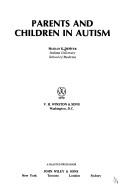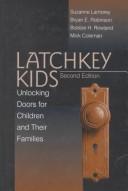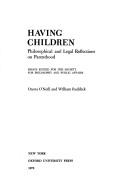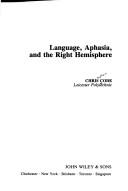| Listing 1 - 10 of 16 | << page >> |
Sort by
|

ISBN: 0873041844 9780873041843 Year: 1981 Publisher: New York (N.Y.): Family service association of America
Abstract | Keywords | Export | Availability | Bookmark
 Loading...
Loading...Choose an application
- Reference Manager
- EndNote
- RefWorks (Direct export to RefWorks)
316.356.2 --- Stepchildren --- -Stepparents --- -#SBIB:316.356.2H3350 --- Step-parents --- Parents --- Children --- Gezinssociologie --- Gezinssociologie: hertrouw (stiefkinderen, stiefouders) --- 316.356.2 Gezinssociologie --- Stepparents --- #SBIB:316.356.2H3350 --- Stepparents - United States --- Stepchildren - United States

ISBN: 047026733X Year: 1979 Publisher: Washington (D.C.) Winston
Abstract | Keywords | Export | Availability | Bookmark
 Loading...
Loading...Choose an application
- Reference Manager
- EndNote
- RefWorks (Direct export to RefWorks)
Parents. --- Autistic Disorder. --- Autism in children --- Autistic disorder --- Childhood autism --- Early infantile autism --- Infantile autism --- Kanner syndrome --- Kanner's syndrome --- Autism spectrum disorders in children --- Autism --- Autism, Early Infantile --- Autism, Infantile --- Kanner's Syndrome --- Disorder, Autistic --- Disorders, Autistic --- Early Infantile Autism --- Infantile Autism --- Infantile Autism, Early --- Kanner Syndrome --- Kanners Syndrome --- Parental Age --- Parenthood Status --- Stepparent --- Step-Parents --- Age, Parental --- Ages, Parental --- Parent --- Parental Ages --- Status, Parenthood --- Step Parents --- Step-Parent --- Stepparents --- Parental Consent --- Parental Notification --- Autism in children. --- Autism, Early infantile. --- Autistic Disorder --- Parents

ISBN: 0761912606 Year: 1999 Publisher: Thousand Oaks Sage
Abstract | Keywords | Export | Availability | Bookmark
 Loading...
Loading...Choose an application
- Reference Manager
- EndNote
- RefWorks (Direct export to RefWorks)
Families --- Latchkey children --- Child Care --- Employment --- Parents --- Parental Age --- Parenthood Status --- Stepparent --- Step-Parents --- Age, Parental --- Ages, Parental --- Parent --- Parental Ages --- Status, Parenthood --- Step Parents --- Step-Parent --- Stepparents --- Parental Consent --- Parental Notification --- Employment Insecurity --- Employment Status --- Labor Force --- Marginal Employment --- Occupational Status --- Precarious Employment --- Status, Occupational --- Underemployment --- Employment Termination --- Employment Insecurities --- Employment, Marginal --- Employment, Precarious --- Insecurity, Employment --- Labor Forces --- Status, Employment --- Termination, Employment --- Rehabilitation, Vocational --- Work --- Child Day Care --- Day Care, Child --- Puericulture --- Care, Child --- Child Day Care Centers --- Infant Care --- Children of working parents

ISBN: 0195024125 9780195024128 Year: 1979 Publisher: New York (N.Y.): Oxford university press
Abstract | Keywords | Export | Availability | Bookmark
 Loading...
Loading...Choose an application
- Reference Manager
- EndNote
- RefWorks (Direct export to RefWorks)
Parenthood --- Moral and ethical aspects --- Nigeria --- In literature --- Parent-Child Relations. --- Parents. --- Children's rights --- -Families --- Child rights --- Children --- Children's human rights --- Rights of children --- Rights of the child --- Human rights --- Parental Age --- Parenthood Status --- Stepparent --- Step-Parents --- Age, Parental --- Ages, Parental --- Parent --- Parental Ages --- Status, Parenthood --- Step Parents --- Step-Parent --- Stepparents --- Parental Consent --- Parental Notification --- Civil rights --- Law and legislation --- Legal status, laws, etc. --- Children's rights. --- Condition des parents --- Enfants --- Ouderschap. --- Ethische aspecten. --- Moral and ethical aspects. --- Aspect moral. --- Droits. --- -Moral and ethical aspects --- Parent-Child Relations --- Parents --- Parent Child Relationship --- Parent-Child Relationship --- Child Relationship, Parent --- Child Relationships, Parent --- Parent Child Relations --- Parent Child Relationships --- Parent-Child Relation --- Parent-Child Relationships --- Relation, Parent-Child --- Relations, Parent-Child --- Relationship, Parent Child --- Relationship, Parent-Child --- Relationships, Parent Child --- Relationships, Parent-Child --- Families --- Parent-Offspring Interaction --- Interaction, Parent-Offspring --- Parent Offspring Interaction --- Parent-Offspring Interactions --- Parenthood - Moral and ethical aspects --- Nigeria - In literature
Book
ISBN: 1280492392 9786613587626 0813552028 9780813552026 0813551358 0813551366 9780813551357 9780813551364 9781280492396 6613587621 Year: 2011 Publisher: New Brunswick, NJ
Abstract | Keywords | Export | Availability | Bookmark
 Loading...
Loading...Choose an application
- Reference Manager
- EndNote
- RefWorks (Direct export to RefWorks)
Within forty-eight hours after birth, the heel of every baby in the United States has been pricked and the blood sent for compulsory screening to detect or rule out a large number of disorders. Newborn screening is expanding rapidly, fueled by the prospect of saving lives. Yet many lives are also changed by it in ways not yet recognized. Testing Baby is the first book to draw on parents’ experiences with newborn screening in order to examine its far-reaching sociological consequences. Rachel Grob’s cautionary tale also explores the powerful ways that parents’ narratives have shaped this emotionally charged policy arena. Newborn screening occurs almost always without parents’ consent and often without their knowledge or understanding, yet it has the power to alter such things as family dynamics at the household level, the context of parenting, the way we manage disease identity, and how parents’ interests are understood and solicited in policy debates.
Parents --- Health Policy --- Neonatal Screening --- Infant, Newborn --- Medical screening. --- Newborn infants --- Mass medical screening --- Mass screening, Medical --- Medical examinations --- Screening, Medical --- Diagnostic services --- Health risk assessment --- Newborns --- Neonate --- Infants, Newborn --- Neonates --- Newborn --- Newborn Infant --- Newborn Infants --- Neonatology --- Newborn Screening --- Infant, Newborn, Screening --- Newborn Infant Screening --- Neonatal Screenings --- Newborn Infant Screenings --- Newborn Screenings --- Screening, Neonatal --- Screening, Newborn --- Screening, Newborn Infant --- Screenings, Neonatal --- Screenings, Newborn --- Screenings, Newborn Infant --- Prenatal Diagnosis --- Healthcare Policy --- National Health Policy --- Health Policies --- Health Policy, National --- Healthcare Policies --- National Health Policies --- Policy, Health --- Policy, Healthcare --- Policy, National Health --- Policy Making --- Parental Age --- Parenthood Status --- Stepparent --- Step-Parents --- Age, Parental --- Ages, Parental --- Parent --- Parental Ages --- Status, Parenthood --- Step Parents --- Step-Parent --- Stepparents --- Parental Consent --- Parental Notification --- Diseases --- Diagnosis.
Book
ISBN: 0802015824 Year: 1970 Publisher: Toronto University of Toronto
Abstract | Keywords | Export | Availability | Bookmark
 Loading...
Loading...Choose an application
- Reference Manager
- EndNote
- RefWorks (Direct export to RefWorks)
Sociology of the family. Sociology of sexuality --- Family. --- Maternal Deprivation. --- Parents. --- Paternal Deprivation. --- 316.356.2 --- Single-parent families --- -Single-parent families --- -Deprivation, Paternal --- Deprivations, Paternal --- Paternal Deprivations --- Parental Age --- Parenthood Status --- Stepparent --- Step-Parents --- Age, Parental --- Ages, Parental --- Parent --- Parental Ages --- Status, Parenthood --- Step Parents --- Step-Parent --- Stepparents --- Parental Consent --- Parental Notification --- Deprivation, Maternal --- Deprivations, Maternal --- Maternal Deprivations --- Extended Family --- Family Life Cycle --- Family Research --- Filiation --- Kinship Networks --- Relatives --- Family Life Cycles --- Family Members --- Family, Reconstituted --- Stepfamily --- Extended Families --- Families --- Families, Extended --- Families, Reconstituted --- Family Member --- Family, Extended --- Kinship Network --- Life Cycle, Family --- Life Cycles, Family --- Network, Kinship --- Networks, Kinship --- Reconstituted Families --- Reconstituted Family --- Research, Family --- Stepfamilies --- Grandparents --- 316.356.2 Gezinssociologie --- Gezinssociologie --- One-parent families --- Single-parent family --- Bibliography --- Family --- Maternal Deprivation --- Parents --- Paternal Deprivation --- -One-parent families --- Deprivation, Paternal --- -Bibliography
Book
ISBN: 9781433809910 1433809915 1433809923 9781433809927 Year: 2011 Publisher: Washington, DC American Psychological Association
Abstract | Keywords | Export | Availability | Bookmark
 Loading...
Loading...Choose an application
- Reference Manager
- EndNote
- RefWorks (Direct export to RefWorks)
"The past 15 years have seen the explosive growth of a new field of study that has come to be known as coparenting (McHale & Sullivan, 2008). Since the turn of the new millennium, fresh new insights and thoughtful empirical research studies explicitly guided by coparenting frameworks have made their way into the peer-reviewed literature almost every few months. But what is coparenting, and why is there a need for an entire volume taking stock of such a relatively new field of study? Broadly speaking, coparenting is an enterprise undertaken by two or more adults who together take on the care and upbringing of children for whom they share responsibility (McHale, Lauretti, Talbot, & Pouquette, 2002). Viewed as a dynamic force in families that is related to, but also distinct from, parent–child or marital subsystems, coparenting is a framework that traces its roots most directly to Salvador Minuchin’s (1974) structural family theory. This book complements and augments healthy marriage frameworks by taking instead the lens of healthy coparenting alliances. We are still very early in the process of learning about how coparenting systems evolve and function, and so this volume marks a moment in time—a point in the evolution of a field in which the questions still outnumber the answers. However, we have brought together for the first time diverse and broad-ranging research on coparenting from a group of contributors who have all provided leadership in this emerging field of research, studying coparenting in a wide range of family forms and systems. Chapters in this volume address what we know about coparenting alliances in nuclear, fragile, and extended kinship systems of different ethnicities and socioeconomic circumstances, in family systems headed by gay and lesbian parents, in circumstances in which biological and foster parents must coordinate as the major coparenting figures in the child’s life, and in postdivorce family systems. The volume has two interrelated goals. The first is to bring together in an integrated fashion the latest research on coparenting, covering as best as possible the full gamut of studies with diverse caretaking systems. The second is to present issues directly relevant to clinical practice, attending to both the assessment of coparenting systems and to new and promising intervention efforts. Although all authors have approached coparenting from the same perspective—as the nature of the alliance between the two (or more) adults who together share responsibility for the child’s care and upbringing— readers will note variability across chapters in how authors have operationalized the construct. (PsycInfo Database Record (c) 2022 APA, all rights reserved)" --Publisher's website.
Parenting, Part-time --- Parenting --- Families --- Parenting, Part-time. --- Parenting. --- Families. --- Rôle parental --- Parents --- Famille --- Aspect psychologique --- Rôle parental. --- Parents. --- Aspect psychologique. --- Family --- Child Rearing --- Parent-Child Relations --- Single Parent --- Extended Family --- Family Life Cycle --- Family Research --- Filiation --- Kinship Networks --- Relatives --- Family Life Cycles --- Family Members --- Family, Reconstituted --- Stepfamily --- Extended Families --- Families, Extended --- Families, Reconstituted --- Family Member --- Family, Extended --- Kinship Network --- Life Cycle, Family --- Life Cycles, Family --- Network, Kinship --- Networks, Kinship --- Reconstituted Families --- Reconstituted Family --- Research, Family --- Stepfamilies --- Grandparents --- Family life --- Family relationships --- Family structure --- Relationships, Family --- Structure, Family --- Social institutions --- Birth order --- Domestic relations --- Home --- Households --- Kinship --- Marriage --- Matriarchy --- Parenthood --- Patriarchy --- Parent behavior --- Parental behavior in humans --- Child rearing --- Parent and child --- Co-parenting --- Parenting, Shared --- Part-time parenting --- Shared parenting --- Joint custody of children --- Single parents --- Parent Child Relationship --- Parent-Child Relationship --- Child Relationship, Parent --- Child Relationships, Parent --- Parent Child Relations --- Parent Child Relationships --- Parent-Child Relation --- Parent-Child Relationships --- Relation, Parent-Child --- Relations, Parent-Child --- Relationship, Parent Child --- Relationship, Parent-Child --- Relationships, Parent Child --- Relationships, Parent-Child --- Single Step-Parent --- Single Stepparent --- Parent, Single --- Parents, Single --- Single Parents --- Single Step Parent --- Single Step-Parents --- Single Stepparents --- Step-Parent, Single --- Step-Parents, Single --- Stepparent, Single --- Stepparents, Single --- Single-Parent Family --- Child Rearings --- Rearing, Child --- Rearings, Child --- Child Care --- Social aspects --- Social conditions --- Garde conjointe des enfants. --- Psychologie de la famille.

ISBN: 0471908754 9780471908753 Year: 1987 Publisher: Chichester Wiley
Abstract | Keywords | Export | Availability | Bookmark
 Loading...
Loading...Choose an application
- Reference Manager
- EndNote
- RefWorks (Direct export to RefWorks)
Dyslexia --- Dyslexie --- Congresses --- Congrès --- Parents. --- -Developmental dyslexia --- Parental Age --- Parenthood Status --- Stepparent --- Step-Parents --- Age, Parental --- Ages, Parental --- Parent --- Parental Ages --- Status, Parenthood --- Step Parents --- Step-Parent --- Stepparents --- Parental Consent --- Parental Notification --- Deficiency, Mental --- Intellectual Development Disorder --- Mental Deficiency --- Mental Retardation, Psychosocial --- Disability, Intellectual --- Idiocy --- Retardation, Mental --- Deficiencies, Mental --- Development Disorder, Intellectual --- Development Disorders, Intellectual --- Disabilities, Intellectual --- Disorder, Intellectual Development --- Disorders, Intellectual Development --- Intellectual Development Disorders --- Intellectual Disabilities --- Mental Deficiencies --- Mental Retardations, Psychosocial --- Psychosocial Mental Retardation --- Psychosocial Mental Retardations --- Retardation, Psychosocial Mental --- Retardations, Psychosocial Mental --- Abnormalities, Multiple --- Cockayne Syndrome --- Cri-du-Chat Syndrome --- De Lange Syndrome --- Fragile X Syndrome --- Laurence-Moon Syndrome --- Prader-Willi Syndrome --- Rubinstein-Taybi Syndrome --- Rett Syndrome --- Angelman Syndrome --- Williams Syndrome --- Brain Diseases, Metabolic, Inborn --- Bardet-Biedl Syndrome --- Intellectual Disability --- Parents --- Professional-Family Relations --- Professional Family Relationship --- Family Relationship, Professional --- Family Relationships, Professional --- Professional Family Relations --- Professional Family Relationships --- Professional-Family Relation --- Relation, Professional-Family --- Relations, Professional-Family --- Relationship, Professional Family --- Relationships, Professional Family --- Mental Retardation --- Mentally Disabled Persons --- Congresses. --- Persons with Mental Disabilities --- Dyslexia - Congresses
Book
ISBN: 0520059077 9780520059078 Year: 1988 Publisher: Berkeley University of California Press
Abstract | Keywords | Export | Availability | Bookmark
 Loading...
Loading...Choose an application
- Reference Manager
- EndNote
- RefWorks (Direct export to RefWorks)
Family demography --- Fertility, Human --- Parenthood. --- Parenthood --- Family Characteristics --- Parents --- Fertility --- #SBIB:314H233 --- #SBIB:314H240 --- #SBIB:316.356.2H3621 --- Below Replacement Fertility --- Differential Fertility --- Fecundability --- Fertility Determinants --- Fertility Incentives --- Fertility Preferences --- Fertility, Below Replacement --- Marital Fertility --- Natural Fertility --- Subfecundity --- World Fertility Survey --- Fecundity --- Determinant, Fertility --- Determinants, Fertility --- Fertility Determinant --- Fertility Incentive --- Fertility Preference --- Fertility Survey, World --- Fertility Surveys, World --- Fertility, Differential --- Fertility, Marital --- Fertility, Natural --- Preference, Fertility --- Preferences, Fertility --- Survey, World Fertility --- Surveys, World Fertility --- World Fertility Surveys --- Parental Age --- Parenthood Status --- Stepparent --- Step-Parents --- Age, Parental --- Ages, Parental --- Parent --- Parental Ages --- Status, Parenthood --- Step Parents --- Step-Parent --- Stepparents --- Parental Consent --- Parental Notification --- Couples --- Family Demography --- Family Life Surveys --- Family Size, Average --- Family Size, Completed --- Family Size, Desired --- Family Size, Expected --- Family Size, Ideal --- Family and Household --- Generations --- Head of Household --- Households --- Matriarchy --- One-Person Household --- Patriarchy --- Family Size --- Average Family Size --- Average Family Sizes --- Characteristic, Family --- Characteristics, Family --- Completed Family Size --- Completed Family Sizes --- Demographies, Family --- Demography, Family --- Desired Family Size --- Desired Family Sizes --- Expected Family Size --- Expected Family Sizes --- Family Characteristic --- Family Demographies --- Family Life Survey --- Family Sizes --- Family Sizes, Average --- Family Sizes, Completed --- Family Sizes, Desired --- Family Sizes, Expected --- Family Sizes, Ideal --- Household --- Household Head --- Household Heads --- Household and Family --- Household, One-Person --- Households, One-Person --- Ideal Family Size --- Ideal Family Sizes --- Life Survey, Family --- Life Surveys, Family --- Matriarchies --- One Person Household --- One-Person Households --- Patriarchies --- Survey, Family Life --- Surveys, Family Life --- Families --- Demography --- Geboorteregeling --- Nuptialiteit en gezin --- Gezinssociologie: vruchtbaarheid: Westers maatschappijen --- Research --- United States --- Population --- Socioeconomic aspects
Book
ISBN: 1441621865 9781441621863 0864318413 9780864318411 9780864318411 Year: 2009 Publisher: Camberwell, Vic. ACER Press
Abstract | Keywords | Export | Availability | Bookmark
 Loading...
Loading...Choose an application
- Reference Manager
- EndNote
- RefWorks (Direct export to RefWorks)
Towards Parenthood aims to assist soon-to-be and current parents manage the complex demands of parenting and strengthen the parent-infant relationship and the couple relationship. The book covers expectations of parenthood, skills in coping, problem-solving, enhancing self-esteem, assertive communication, bonding with your baby and understanding your baby's cues.
Infants -- Care. --- Infants. --- Parent and infant. --- Parenting. --- Parenthood --- Parent and infant --- Couples --- Parents --- Popular Works --- Education --- Psychology --- Publication Formats --- Persons --- Nuclear Family --- Behavioral Sciences --- Anthropology, Education, Sociology and Social Phenomena --- Family --- Named Groups --- Publication Characteristics --- Behavioral Disciplines and Activities --- Psychology, Social --- Sociology --- Psychiatry and Psychology --- Behavior and Behavior Mechanisms --- Social Sciences --- Family & Marriage --- Sociology & Social History --- Science, Social --- Sciences, Social --- Social Science --- Behavior And Behavior Mechanism --- General Social Development and Population --- Psychology, Perceptual --- Social Psychology --- Perceptual Psychology --- Extended Family --- Family Life Cycle --- Family Research --- Filiation --- Kinship Networks --- Relatives --- Family Life Cycles --- Family Members --- Family, Reconstituted --- Stepfamily --- Extended Families --- Families --- Families, Extended --- Families, Reconstituted --- Family Member --- Family, Extended --- Kinship Network --- Life Cycle, Family --- Life Cycles, Family --- Network, Kinship --- Networks, Kinship --- Reconstituted Families --- Reconstituted Family --- Research, Family --- Stepfamilies --- Grandparents --- Proxemics --- Behavioral Science --- Proxemic --- Science, Behavioral --- Sciences, Behavioral --- Daughters --- Sons --- Daughter --- Families, Nuclear --- Family, Nuclear --- Nuclear Families --- Son --- Person --- Factors, Psychological --- Psychological Factors --- Psychological Side Effects --- Psychologists --- Psychosocial Factors --- Side Effects, Psychological --- Factor, Psychological --- Factor, Psychosocial --- Factors, Psychosocial --- Psychological Factor --- Psychological Side Effect --- Psychologist --- Psychosocial Factor --- Side Effect, Psychological --- Activities, Educational --- Educational Activities --- Workshops --- Literacy Programs --- Training Programs --- Activity, Educational --- Educational Activity --- Literacy Program --- Program, Literacy --- Program, Training --- Programs, Literacy --- Programs, Training --- Training Program --- Workshop --- Students --- Parental Age --- Parenthood Status --- Stepparent --- Step-Parents --- Age, Parental --- Ages, Parental --- Parent --- Parental Ages --- Status, Parenthood --- Step Parents --- Step-Parent --- Stepparents --- Parental Consent --- Parental Notification --- Interpersonal relations --- Infant and parent --- Infant psychology --- Parent and child --- education --- education. --- psychology.
| Listing 1 - 10 of 16 | << page >> |
Sort by
|

 Search
Search Feedback
Feedback About UniCat
About UniCat  Help
Help News
News